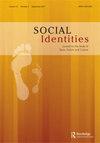The laws of desire: rulings on sex and sexuality in India
IF 0.7
Q3 ETHNIC STUDIES
引用次数: 1
Abstract
This mini-hardbound book by Madhavi Menon brings to its readers debates and discourse on identity formation in India, based on conceptualisation of desire. She fiercely counters the courtroom sagas of notable legal suits ranging from art, performance, prostitutes, menstruation, moral policing of women’s clothing, adultery, registers of ‘love jihad’, homosexuality, etc. Menon brings this book with the very rationale of challenging the idea that ‘law is premised upon truth even though it reflects socially constructed biases, prejudices and anxieties’. Menon draws upon registers of religion, art, patriarchy, and heterosexuality as the foundation upon which laws are formulated. Further projecting, how law has nothing to do with gender and orientation of any individual (e.g. why does one need to provide gender details on ration card to secure government subsidised food?). This book being launched soon after her previous work (2018), ‘Infinite Variety: A History of Desire in India’, makes the present book, a work-in-progress series on the discourse of sexuality in India. This book is rostered into six chapters. The first chapter titled Preamble sets the tone of the book by juxtaposing law and desire. She argued that transgression Patriarchal control, contesting the moral regime of society and representing many facets of sexuality; endangers the stability of society that law wishes to confer. She writes,欲望的法则:印度对性和性行为的裁决
Madhavi Menon的这本迷你精装书为读者带来了关于印度身份形成的辩论和讨论,基于欲望的概念化。她激烈地反驳了著名法律诉讼的法庭传说,从艺术、表演、妓女、月经、女性服装的道德监管、通奸、“爱情圣战”登记、同性恋等。梅农在这本书中提出了挑战“法律是以真理为前提的,尽管它反映了社会构建的偏见,偏见和焦虑。梅农将宗教、艺术、父权制和异性恋作为制定法律的基础。进一步预测,法律如何与任何个人的性别和取向无关(例如,为什么需要在配给卡上提供性别详细信息才能获得政府补贴食品?)。这本书是在她上一部作品(2018年)《无限多样性:印度欲望史》之后不久推出的,这本书成为了一部关于印度性话语的正在进行的系列作品。这本书共分为六章。第一章标题为序言,通过并置法律和欲望来确定本书的基调。她认为,这违反了父权制的控制,挑战了社会的道德制度,代表了性的许多方面;危及法律希望赋予的社会稳定。她写道,
本文章由计算机程序翻译,如有差异,请以英文原文为准。
求助全文
约1分钟内获得全文
求助全文
来源期刊

Social Identities
ETHNIC STUDIES-
CiteScore
2.00
自引率
0.00%
发文量
22
期刊介绍:
Recent years have witnessed considerable worldwide changes concerning social identities such as race, nation and ethnicity, as well as the emergence of new forms of racism and nationalism as discriminatory exclusions. Social Identities aims to furnish an interdisciplinary and international focal point for theorizing issues at the interface of social identities. The journal is especially concerned to address these issues in the context of the transforming political economies and cultures of postmodern and postcolonial conditions. Social Identities is intended as a forum for contesting ideas and debates concerning the formations of, and transformations in, socially significant identities, their attendant forms of material exclusion and power.
 求助内容:
求助内容: 应助结果提醒方式:
应助结果提醒方式:


